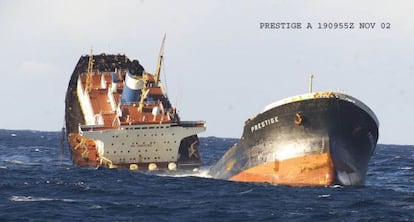Prestige judge finds “no criminal responsibility” for huge oil disaster
78-year-old captain, Apostolos Mangouras, handed light sentence Magistrate absolves Aznar government of blame for Spain’s worst-ever spill

Eleven years after Spain’s biggest environmental catastrophe, a judge in A Coruña on Wednesday acquitted the captain of the Prestige oil tanker, the former director of the Merchant Marine during the Aznar administration and the ship’s chief engineer, all of whom had been charged for their involvement in the mammoth oil spill.
Reading from a lengthy sentence, presiding Judge Juan Luis Pía also said that the then government of Popular Party (PP) Prime Minister José María Aznar should not be held responsible for the November 13, 2002 incident, in which some 63,000 tons of crude were spilled into the Atlantic, polluting Spain’s northwestern coastline, parts of the Portuguese coast and reaching as far as France.
“No one knows exactly what caused the disaster,” Pía said on Wednesday, which marked the 11th anniversary of the disaster. “There is no criminal responsibility.”
Apostolos Mangouras, the Greek captain of the tanker, José Luis López Sors, the former Merchant Marine chief, and Nikolaos Argyropoulos, the chief engineer, were the only defendants facing charges of committing environmental crimes. A third defendant, Ireneo Maloto, the first officer on the tanker, never showed up for trial and his whereabouts are unknown.
Nevertheless, Mangouras, now 78, was given a nine-month sentence for “serious disobedience” for initially refusing to allow the tanker to be towed for a three-hour period. Because of his age and the short nature of his sentence, he is not expected to serve any time.
In the sentence, the A Coruña provincial court judge recognized the serious economic consequences from the breaking up of the oil tanker. Besides the crude that was spilled, toxic waste also escaped, with a total of 2,900 kilometers of shoreline and 1,177 beaches affected by the resulting pollution.
“From the time the tanker broke and sunk, 115 hours had passed,” he said. “The only thing that could be concluded was that there were structural problems [in the 26-year-old ship].”
The ruling also backed the decision taken at the time by the Aznar government to try to move the tanker far away from shore before it broke in half. Nevertheless, the court formally admonished Mangouras, for not “formally advising” the Merchant Marine of what had occurred. The court also stated that the nine-month sentence for disobedience stemmed from the captain of the Prestige refusing for three hours to allow the ship to be towed away from Galicia’s shores, “an unacceptable delay.”
Mangouras, Argyropoulos and López Sors were in the dock for nine months. The trial ended in July after an eight-year investigation of the case. Two additional years also passed before the case went to trial, making it one of the longest litigations in modern Spanish history.
The judge placed responsibility on the American Bureau of Shipping (ABS), the powerful US classification society that authorized the aging tanker to transport the petroleum. The Spanish government had tried to sue ABS in the United States, but that case was dismissed. Had Mangouras been sentenced to 12 years, as prosecutors had requested, the Spanish government had planned to seek 4.328 billion euros in damages from the British insurer of the vessel, The London Steam-Ship Owners Mutual Insurance, which is the only company involved in the convoluted line of ownership of the Prestige to be successfully implicated in the case. However, the court ruled that no civil liability for the disaster exists.
The prestige finally succumbed to the sea some 130 nautical miles from the coast of Galicia. It was the third disaster of its kind to strike Spain’s northern coastline after the tankers Mar Egeo went down in 1992 and the Urquiola in 1976. In the inquiries into those spills, the Spanish government was held responsible.
Tu suscripción se está usando en otro dispositivo
¿Quieres añadir otro usuario a tu suscripción?
Si continúas leyendo en este dispositivo, no se podrá leer en el otro.
FlechaTu suscripción se está usando en otro dispositivo y solo puedes acceder a EL PAÍS desde un dispositivo a la vez.
Si quieres compartir tu cuenta, cambia tu suscripción a la modalidad Premium, así podrás añadir otro usuario. Cada uno accederá con su propia cuenta de email, lo que os permitirá personalizar vuestra experiencia en EL PAÍS.
¿Tienes una suscripción de empresa? Accede aquí para contratar más cuentas.
En el caso de no saber quién está usando tu cuenta, te recomendamos cambiar tu contraseña aquí.
Si decides continuar compartiendo tu cuenta, este mensaje se mostrará en tu dispositivo y en el de la otra persona que está usando tu cuenta de forma indefinida, afectando a tu experiencia de lectura. Puedes consultar aquí los términos y condiciones de la suscripción digital.








































